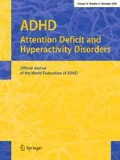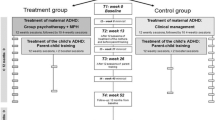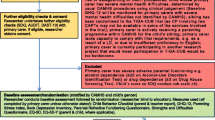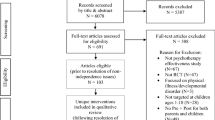Abstract
Parental ADHD may be a significant barrier to a successful treatment for the child’s ADHD. The objective of our randomized controlled trial was to evaluate whether the treatment for maternal ADHD improves the efficacy of a behavioural parent training for children’s ADHD. Patient enrolment and a description of the full analysis set (FAS) of mother–child pairs with non-missing baseline data are presented. One hundred and forty-four mother–child pairs were randomized to two treatments for maternal ADHD: cognitive behavioural group psychotherapy plus open methylphenidate treatment or control treatment (supportive counselling). After 3 months of treatment for maternal ADHD, mother–child pairs participated in a behavioural parent–child training. Assessment for eligibility included standardized instruments. After pre-screening out of 444 mother–child pairs, 206 were evaluated for trial participation and 144 were randomized. The FAS was built up by 143 dyads (children: mean age 9.4 years, 73 % males; mothers: mean age: 38.3 years). Fifty-two per cent of the children and 66 % of the mothers had combined ADHD subtype. Current axis-I co-morbidity rates were 48 % in children and 31 % in mothers. Maternal axis-II co-morbidity was 20.1 %. Fifty-seven per cent of the mothers lived together with the father of the index-child, and 29 % were single mothers. Sixty-two per cent had part-time or full-time employment. There was a selection bias excluding mothers with lack of time and effort for participation and mothers affected by coexisting mental and physical illness. Nevertheless, for our trial we were able to collect a sample comparable to routine psychiatric outpatient settings (registration: CCT-ISRCTN73911400, funding: BMBF-01GV0605).

Similar content being viewed by others
References
Arnold EH, O’Leary SG, Edwards GH (1997) Father involvement and self-reported parenting of children with attention deficit-hyperactivity disorder. J Consult Clin Psychol 65(2):337–342
Banks T, Ninowski JE, Mash EJ, Semple DL (2008) Parenting behavior and cognitions in a community sample of mothers with and without symptoms of attention-deficit/hyperactivity disorder. J Child Fam Stud 17(1):28–43
Chronis-Tuscano A, Seymour KE, Stein MA, Jones HA, Jiles CD, Rooney ME, Conlon CJ, Efron LA, Wagner SA, Pain J, Rob AS (2008) Efficacy of osmotic-release oral system (OROS) methylphenidate for mothers with attention-deficit/hyperactivity disorder (ADHD). J Clin Psychiatry 69(12):1938–1947
Chronis-Tuscano A, Rooney M, Seymour K, Lavin HJ, Pian J, Robb A, Efron L, Conlon C, Stein M (2010) Effects of maternal stimulant medication on observed parenting in mother-child dyads with attention-deficit/hyperactivity disorder. J Clin Child Adolesc Psychol 39(4):581–587
Daly JM, Fritsch SL (1995) Case study: maternal residual attention deficit disorder associated with failure to thrive in a two-month-old infant. J Am Acad Child Adolesc Psychiatry 34(1):55–57
Deutsche Gesellschaft für Kinder-und Jugendpsychiatrie PuP(ea (2007) Leitlinien zur Diagnostik und Therapie von psychischen Störungen im Säuglings-, Kindes- und Jugendalter, 3rd edn. Deutscher Ärzte-Verlag, Köln
Deutsche K-SADS-Arbeitsgruppe (2001) ICD-10, DSM III-R, DSM-IV Fassung der Kiddi-SADS-PL (5. Auflage der deutschen Forschungsversion, erweitert um ICD-10-Diagnostik). Klinik für Psychiatrie und Psychotherapie des Kindes- und Jugendalters, Frankfurt
Döpfner M, Schürmann S, Frölich J (2007) Therapieprogramm für Kinder mit hyperkinetischem und oppositionellem Problemverhalten. THOP, 4th edn. Beltz, Weinheim
Evans SW, Vallano G, Pelham W (1994) Treatment of parenting behavior with a psychostimulant: a case study of an adult with attention-deficit hyperactivity disorder. J Child Adolesc Psychopharmacol 4(1):63–69
Fayyad J, de Graaf R, Kessler R, Alonso J, Angermeyer M, Demyttenaere K, de Girolamo G, Haro JM, Karam EG, Lara C, Lepine J, Ormel J, Posada-Villa J, Zaslavsky AM, Jin R (2007) Cross-national prevalence and correlates of adult attention-deficit hyperactivity disorder. Br J Psychiatry 190:402–409
Gillberg C, Gillberg I, Rasmussen P, Kadesjo B, Soderstrom H, Rastam M, Johnson M, Rothenberger A, Niklasson L (2004) Co-existing disorders in ADHD—implications for diagnosis and intervention. Eur Child Adolesc Psychiatry 13(Suppl 1):I80–I92
Harvey E, Danforth JS, McKee TE, Ulaszek WR, Friedman JL (2003) Parenting of children with attention-deficit/hyperactivity disorder (ADHD): the role of parental ADHD symptomatology. J Atten Disord 7(1):31–42
Hesslinger B, Philipsen A, Richter H (2004) Psychotherapie der ADHS im Erwachsenenalter: ein Arbeitsbuch (psychotherapy of adult attention deficit disorder with hyperactivity: a manual). Hogrefe, Göttingen
Jacob CP, Romanos J, Dempfle A, Heine M, Windemuth-Kieselbach C, Kruse A, Reif A, Walitza S, Romanos M, Strobel A, Brocke B, Schafer H, Schmidtke A, Boning J, Lesch KP (2007) Co-morbidity of adult attention-deficit/hyperactivity disorder with focus on personality traits and related disorders in a tertiary referral center. Eur Arch Psychiatry Clin Neurosci 257(6):309–317
Jans T, Philipsen A, Graf E, Ihorst G, Gerlach M, Warnke A (2009) Does the treatment of maternal attention deficit and hyperactivity disorder (ADHD) enhance the efficacy of a behavioural parent training for the treatment of their children’s ADHD? Study protocol of a randomized controlled multicentre trial. ADHD Atten Def Hyp Disord 1(1):33–45
Kaufman J, Birmaher B, Brent D, Rao U, Ryan N (1996) Kiddie-Sads-Present and Lifetime Version (K-SADS-PL). University of Pittsburgh School of Medicine, Department of Psychiatry, Pittsburgh
Landis JR, Koch GG (1977) The measurement of observer agreement for categorical data. Biometrics 33(1):159–174
Lehrl S (1977) Mehrfachwahl-Wortschatz-Intelligenztest Form B. Straube, Erlangen
McGough JJ (2005) Psychiatric comorbidity in adult attention deficit hyperactivity disorder: findings from multiplex families. Am J Psychiatry 162(9):1621–1627
Murray C, Johnston C (2006) Parenting in mothers with and without attention-deficit/hyperactivity disorder. J Abnorm Psychol 115(1):52–61
Philipsen A, Richter H, Peters J, Alm B, Sobanski E, Colla M, Münzebrock M, Scheel C, Jacob C, Perlov E, van Tebartz ElstL, Hesslinger B (2007) Structured group psychotherapy in adults with attention deficit hyperactivity disorder. J Nerv Ment Dis 195(12):1013–1019
Philipsen A, Graf E, van Tebartz ElstL, Jans T, Warnke A, Hesslinger B, Ebert D, Gerlach M, Matthies S, Colla M, Jacob C, Sobanski E, Alm B, Rösler M, Ihorst G, Gross-Lesch S, Gentschow L, Kis B, Huss M, Lieb K, Schlander M, Berger M (2010) Evaluation of the efficacy and effectiveness of a structured disorder tailored psychotherapy in ADHD in adults: study protocol of a randomized controlled multicentre trial. ADHD Atten Def Hyp Disord 2(4):203–212
Retz-Junginger P, Retz W, Blocher D, Weijers HG, Trott GE, Wender PH, Rossler M (2002) Wender Utah Rating Scale (WURS-k) Die deutsche Kurzform zur retrospektiven Erfassung des hyperkinetischen Syndroms bei Erwachsenen. Nervenarzt 73(9):830–838
Retz-Junginger P, Retz W, Blocher D, Stieglitz R, Georg T, Supprian T, Wender PH, Rosler M (2003) Reliabilitat und Validitat der Wender-Utah-Rating-Scale-Kurzform. Retrospektive Erfassung von Symptomen aus dem Spektrum der Aufmerksamkeitsdefizit/Hyperaktivitatsstorung. Nervenarzt 74(11):987–993
Rösler M, Retz W, Retz-Junginger P, Thome J, Supprian T, Nissen T, Stieglitz R, Blocher D, Hengesch G, Trott GE (2004) Instrumente zur Diagnostik der Aufmerksamkeitsdefizit-/Hyperaktivitatsstorung (ADHS) im Erwachsenenalter—Selbstbeurteilungsskala (ADHS-SB) und Diagnosecheckliste (ADHS-DC). Nervenarzt 75(9):888–895
Sonuga-Barke EJ, Daley D, Thompson M (2002) Does maternal ADHD reduce the effectiveness of parent training for preschool children’s ADHD? J Am Acad Child Adolesc Psychiatry 41(6):696–702
Statistsiches Bundesamt (Federal Statistical Office) (2009) Statistisches Jahrbuch 2009 für die Bundesrepublik Deutschland (Statistical Yearbook 2009 for the Federal Republic of Germany). Statistisches Bundesamt, Wiesbaden
Surman CB, Monuteaux MC, Petty CR, Faraone SV, Spencer TJ, Chu NF, Biederman J (2010) Representativeness of participants in a clinical trial for attention-deficit/hyperactivity disorder? Comparison with adults from a large observational study. J Clin Psychiatry 71(12):1612–1616
Weiss R (2006) CFT 20-R, Grundintelligenztest Skala 2—Revision. Hogrefe, Goettingen
Weiss R, Osterland J (1997) CFT 1, Grundintelligenztest Skala 1. Hogrefe, Goettingen
Weiss M, Hechtman L, Weiss G, Jellinek MS (2000) ADHD in parents. J Am Acad Child Adolesc Psychiatry 39(8):1059–1061
Wittchen HU, Zaudig M, Fydrich T (1997) SKID - Strukturiertes Klinisches Interview fuer DSM IV. Achse I und II, Hogrefe
Acknowledgments
Our network on psychotherapy of ADHD is supported by the German Federal Ministry of Education and Research (BMBF; 01GV0605, 01GV0606) within the framework ‚research networks on psychotherapy. We thank Dr. Fischer (MEDICE Arzneimittel Puetter GmbH & Co. KG) for his advice in preparing the study protocol and case report forms as well as his assistance in SAE management. Prof. Dr. F. Mattejat gave helpful expert advice in planning the study. We are also grateful that HOGREFE and BELTZ publishers provided treatment manuals for free. We gratefully thank all participating families and all our partners for their cooperation.
Conflict of interest
T Jans: None; E Graf: None; C Jacob has received speaker’s honoraria by Medice and is member of the Adivisory Bord AADHD of this company; U Zwanzger: None; S Groß-Lesch: None; S Matthies received speakers fees by Janssen-Cilag and has been involved in clinical trials conducted by Janssen-Cilag and Lilly; E Perlov: None; K Hennighausen: None; M Jung has not received any industrial honoraria; M Rösler is member of the speakers bureau of Medice, Janssen and Shire; he is a member of the advisory boards of Lilly, Shire, Medice and Janssen. He has performed clinical trials for Medice and Lilly; M Schulte-Altedorneburg: None; A von Gontard: None; S Hänig: None; E Sobanski: advisory boards, IITs, lectures or Phase-III-studies within the last 3 years: Medice, Shire, Eli Lilly and Novartis; B. Alm: advisory boards, lectures or phase-III-studies within the last 3 years: Medice, Eli Lilly; L Poustka has received speaker’s honoraria by Ely Lilly and Shire during the last 3 years; L Bliznak: None; M Colla: advisory boards, speaker’s honoraria or phase-III studies within the last 3 years: Shire, Eli Lilly and Novartis; L Gentschow: None; R Burghardt: 2009 till 2011—unrestricted research grant of Charité University Medicin Berlin; H Salbach-Andrae: None; K Becker: Prof. Katja Becker is/has been involved in research/clinical trials with Ely Lilly and Shire, is on the Advisory Board of Eli Lilly/Germany, was paid for public speaking by Eli Lilly and Shire and received conference attendance support from Shire and Eli Lilly; M Holtmann served in an advisory or consultancy role for Lilly, Novartis, Shire and Bristol-Myers Squibb and received conference attendance support or was paid for public speaking by AstraZeneca, Bristol-Myers Squibb, Janssen-Cilag, Lilly, Medice, Neuroconn, Novartis and Shire; C Freitag has received speaker’s honoraria by Eli Lilly and Novartis during the last 3 years. She was an independent clinical consultant for Desitin in 2010; A Warnke received speakers fees by Janssen-Cilag, Medice, Novartis and Lilly and has been involved in clinical trials conducted by Lilly, Novartis, Medice and Shire; A Philipsen: advisory boards, lectures, phase-III studies or travel grants within the last 3 years: Eli Lilly, Janssen-Cilag, Medice, Novartis and Shire.
Author information
Authors and Affiliations
Corresponding author
Additional information
This study was conducted by the AIMAC study group.
Please refer the “Appendix” section for AIMAC group members.
Appendix
Appendix
Members of the AIMAC study group (ADHD in Mothers and Children; coordinating investigator: Prof. Dr. A. Warnke, Wuerzburg University Hospital) are our colleagues at the study sites at Freiburg (University Medical Center Freiburg: Department of Psychiatry and Psychotherapy, Director: Prof. Dr. M. Berger; Department of Child and Adolescent Psychiatry and Psychotherapy, Director: Prof. Dr. E. Schulz), Homburg (Saarland University Hospital and Saarland University Faculty of Medicine: Institute for Forensic Psychology and Psychiatry, Director: Prof. Dr. M. Roesler; Department of Child and Adolescent Psychiatry and Psychotherapy, Director: Prof. Dr A. v. Gontard), Mannheim (Central Institute for Mental Health: Clinic for Psychiatry and Psychotherapy, Director: Prof. Dr. A. Meyer-Lindenberg; Clinic for Child and Adolescent Psychiatry and Psychotherapy, Director: Prof. Dr. Dr. T. Banaschewski), Berlin (Charité - University Medicine, Campus Benjamin Franklin, Department of Psychiatry and Psychotherapy, Director: Prof. Dr. I. Heuser; Campus Virchow-Klinikum, Department of Child and Adolescent Psychiatry, Psychosomatics and Psychotherapy, Director: Prof. Dr. U. Lehmkuhl), Wuerzburg (Wuerzburg University Hospital: Department of Psychiatry, Psychosomatics and Psychotherapy, Director: Prof. Dr. J. Deckert; Department of Child and Adolescent Psychiatry, Psychosomatics and Psychotherapy, Director: Prof. Dr. M. Romanos), members of the Clinical Trials Unit at University Medical Center Freiburg (Director: R. Bredenkamp) as well as members of the Data Monitoring and Safety Committee (Prof. Dr. Dr. H. Remschmidt, Prof. Dr. G. Wassmer, PD Dr. N. Wodarz). Independent supervision is carried out by staff members at the Department of Child and Adolescent Psychiatry and Psychotherapy at the Cologne University Hospital (parent training) and at the Institute for Psychology of Freiburg University in cooperation with colleagues in private practice (treatment of mothers). Other projects in our network on psychotherapy research in ADHD (speaker: Prof. Dr. A. Warnke, Wuerzburg University Hospital) are coordinated by PD Dr. A. Philipsen (University Medical Center Freiburg, Psychotherapy of adult ADHD), Prof. Dr. L. Tebartz van Elst (University Medical Center Freiburg, functional and morphometric brain mapping) and Prof. Dr. K.-P. Lesch (Wuerzburg University Hospital, molecular genetics).
Rights and permissions
About this article
Cite this article
Jans, T., Graf, E., Jacob, C. et al. A randomized controlled multicentre trial on the treatment for ADHD in mothers and children: enrolment and basic characteristics of the study sample. ADHD Atten Def Hyp Disord 5, 29–40 (2013). https://doi.org/10.1007/s12402-012-0092-4
Received:
Accepted:
Published:
Issue Date:
DOI: https://doi.org/10.1007/s12402-012-0092-4




